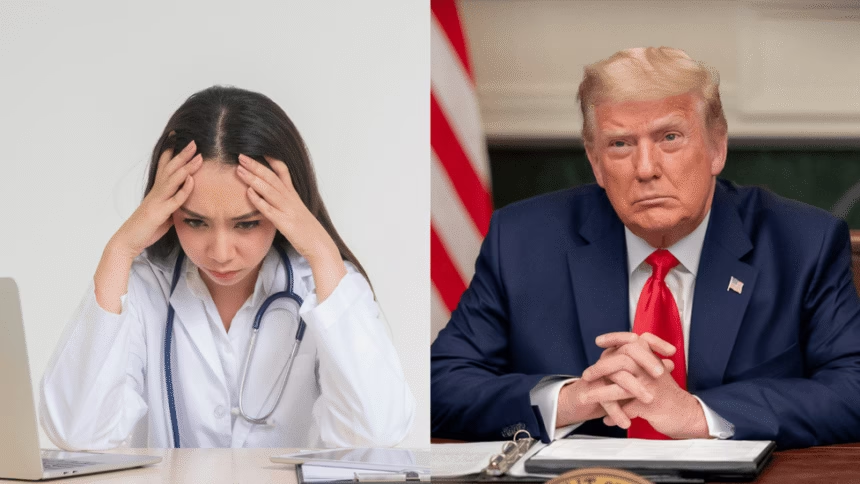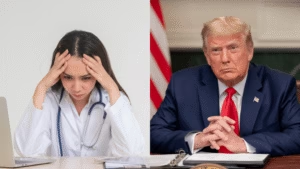The Trump administration is facing a wave of criticism after the Department of Education decided to exclude nursing studies from the category of “professional degrees” as part of the implementation of the sweeping legislative package dubbed “One Big Beautiful Bill,” which substantially modifies the rules governing higher education funding and student loans.
The measure, which could limit nurses’ access to certain types of federal loans, is provoking a strong reaction in the healthcare sector, even as the United States confronts a historic nursing shortage.
A Regulatory Change with Serious Consequences
According to Newsweek, the Department of Education’s new definition now restricts “professional degrees” to traditional fields such as medicine, pharmacy, law, dentistry, optometry, veterinary medicine, clinical psychology, theology, osteopathy, podiatry, and chiropractic.
This new classification excludes essential professions such as nurse practitioners, physician assistants, physical therapists, and audiologists—professionals who are nevertheless indispensable to the functioning of the American healthcare system.
This definition determines access to the $200,000 federal loan ceiling reserved for students enrolled in a “professional program.” Nursing students—including those in advanced degree programs (Master’s, DNP, Ph.D.)—will therefore no longer have access to these loans.
Concerns About Training and Healthcare System Capacity
Professional associations say they are alarmed. According to the American Nurses Association (ANA), more than 260,000 students are currently enrolled in Bachelor of Science in Nursing (BSN) programs, and more than 42,000 in associate degree programs (ADN).
In a statement reported by Nursing World, ANA President Jennifer Mensik Kennedy warns that nurses represent the backbone of the national healthcare system. At a time when the country is experiencing a historic staffing shortage, limiting access to funding for advanced education threatens, in her view, “the very foundations of patient care.”
She also emphasizes that in many rural or underserved communities, nurse practitioners are sometimes the only primary care providers available.
Trump Administration Denounces a “False Controversy”
Faced with growing anger, the administration responds with denial. Ellen Keast, Department of Education spokesperson for higher education, tells Newsweek that this is “fake news in all its glory.” She adds that the Department has always maintained a consistent definition of what constitutes a professional degree and accuses certain institutions of protesting regulations that never existed, particularly because “their unlimited access to taxpayer money is over.”
According to Ms. Keast, the definition reflects a “consensus” between the government and universities that participated in the regulatory process.
For Experts, an “Incomprehensible” and “Devastating” Decision
For many healthcare system experts, the decision reveals a profound misunderstanding of the country’s needs.
Patricia (Polly) Pittman, professor of health policy at George Washington University, describes it as “a punch in the gut for the nursing profession.” She believes the government should be seeking ways to retain nurses rather than erecting additional barriers. Beyond the symbolic level, she sees it primarily as “a major obstacle to training in a sector already experiencing shortages.”
She notes that advancement opportunities—from LPN to ADN, from BSN to nurse practitioner—constitute one of the principal drivers of workforce retention.
For Olga Yakusheva, professor of nursing science at Johns Hopkins University, the consequence will be immediate: fewer nurses will be able to afford advanced training. This will reduce, in her view, the capacity of academic programs to train future generations. She also predicts a worsening shortage in primary care, particularly in regions already suffering from a chronic lack of physicians.
Testimony from the Field: Frustration and Sense of Injustice
On TikTok, a New Jersey nurse summarizes the anger felt by a large portion of the profession. In a video that went viral, she outlines her career trajectory: ten years of education, $210,000 in debt, 15 years of experience in trauma and emergency services. She concludes bitterly that her degree is no longer considered professional and fears that this decision could “leave the country with one million fewer nurses.”
A National Impact on Access to Care
Experts interviewed by Newsweek are unanimous: by excluding nursing from professional degrees, the Trump administration risks creating a domino effect: reduced enrollment in advanced programs, decreased teaching capacity, fewer nursing graduates at the bachelor’s and associate levels, increased labor costs, greater dependence on foreign-trained nurses, and increased pressure on hospitals and clinics.
Antonia Villarruel, dean of the School of Nursing at the University of Pennsylvania, summarizes the gravity of the situation: failing to include nursing as a professional degree is not merely an insult to the nation’s most respected profession, but constitutes, in her view, “a serious blow to our nation’s health.”
Implementation Scheduled for 2026
According to the organization New America, the new measures—including loan caps and the new definition of a “professional program”—will take effect on July 1, 2026.
In the meantime, professional groups, advocacy associations, health schools, and academic experts are preparing for an intense regulatory and political battle to secure a government reversal.







